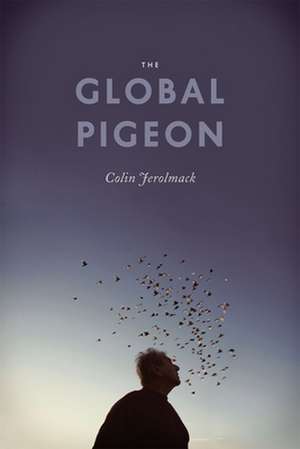The Global Pigeon: Fieldwork Encounters and Discoveries
Autor Colin Jerolmacken Limba Engleză Hardback – 4 apr 2013
The pigeon is the quintessential city bird. Domesticated thousands of years ago as a messenger and a source of food, its presence on our sidewalks is so common that people consider the bird a nuisance—if they notice it at all. Yet pigeons are also kept for pleasure, sport, and profit by people all over the world, from the “pigeon wars” waged by breeding enthusiasts in the skies over Brooklyn to the Million Dollar Pigeon Race held every year in South Africa.
Drawing on more than three years of fieldwork across three continents, Colin Jerolmack traces our complex and often contradictory relationship with these versatile animals in public spaces such as Venice’s Piazza San Marco and London’s Trafalgar Square and in working-class and immigrant communities of pigeon breeders in New York and Berlin. By exploring what he calls “the social experience of animals,” Jerolmack shows how our interactions with pigeons offer surprising insights into city life, community, culture, and politics. Theoretically understated and accessible to interested readers of all stripes, The Global Pigeon is one of the best and most original ethnographies to be published in decades.
Preț: 482.02 lei
Preț vechi: 613.77 lei
-21% Nou
Puncte Express: 723
Preț estimativ în valută:
92.32€ • 95.11$ • 77.33£
92.32€ • 95.11$ • 77.33£
Carte indisponibilă temporar
Doresc să fiu notificat când acest titlu va fi disponibil:
Se trimite...
Preluare comenzi: 021 569.72.76
Specificații
ISBN-13: 9780226001890
ISBN-10: 022600189X
Pagini: 288
Ilustrații: 10 color plates, 36 halftones, 1 line drawing
Dimensiuni: 152 x 229 x 23 mm
Greutate: 0.53 kg
Ediția:New.
Editura: University of Chicago Press
Colecția University of Chicago Press
Seria Fieldwork Encounters and Discoveries
ISBN-10: 022600189X
Pagini: 288
Ilustrații: 10 color plates, 36 halftones, 1 line drawing
Dimensiuni: 152 x 229 x 23 mm
Greutate: 0.53 kg
Ediția:New.
Editura: University of Chicago Press
Colecția University of Chicago Press
Seria Fieldwork Encounters and Discoveries
Notă biografică
Colin Jerolmack is assistant professor of sociology and environmental studies at New York University.
Cuprins
Introduction: Experiencing the City through the Quintessential Urban Bird
Part 1: The Pedestrian Pigeon
1 Feeding the Pigeons: Sidewalk Sociability in Greenwich Village
2 “Do Not Feed the Pigeons”: Cultural Heritage and the Politics of Place in Venice and London
Part 2: The Totemic Pigeon
3 New York’s Rooftop Pigeon Flyers: Crafting Nature and Anchoring the Self
4 The Turkish Pigeon Caretakers of Berlin: Primordial Ties in a Migrant Community
5 Joey’s Brooklyn Pet Shop: Cosmopolitan Ties in a Changing Urban Landscape
Part 3: Deep Play
6 The Bronx Homing Pigeon Club: Nature, Nurture, and the Enchantment of “the Poor Man’s Horse Racing”
7 South Africa’s Million Dollar Pigeon Race: Rationalizing and Globalizing “the Pigeon Game”
8 Conclusion: Changing Ecologies
Acknowledgments
Notes
References
Index
Recenzii
"Colin Jerolmack’s book is a wonderful celebration of the ways some people interact with pigeons."
"I gladly assert that this innovative monograph belongs to the small and excellent body of work that carries urban ethnography into the twenty first century, and this is no small feat at all."
"This is a scholarly but highly accessible account of some of the ways in which human beings interact with pigeons.
Jerolmack draws on an impressive breadth of ethnographic research conducted across several years and three continents, and constructs a sustained theoretical argument calling for the integration of studies of human-animal interaction into the sociological canon, and polemicising convincingly with anthropocentric as well as natureromanticising accounts of the relationship between human beings and the natural world."
". . . In New York, hundreds of people casually toss chunks of bagel or pizza crust at feral pigeons; others carry whole bags of bread to feed them with, despite long-standing efforts by ciry officials to discourage the practice. In The Global Pigeon, his ethnography of human-pigeon encounters, Colin Jerolmack makes an imaginative and convincing case against interpreting any of these activities as 'driven by a singular deep-seated need to connect to nature', as environmental scholars persuaded by the biophilia hypothesis might."
"The Global Pigeon combines detailed and sustained observation of the kind ordinarily focused on one research site with a global reach and fieldwork done in a variety of places, all over the world. The overall result is an intellectually satisfying book that helps us see complexity where we wouldn't have otherwise, and gives us interesting reading about a world of interaction that goes on around us all the time."
"The Global Pigeon effortlessly straddles the literature on urban community and environmental sociology, as well as speaking to debates about identity and identity-formation and the literature about race, ethnicity, and inequality. Its ability to bridge different literatures will, I think, make it extremely widely read and probably widely imitated."
“This is the most important book yet written about human and animal interaction. It is full of surprising discoveries. Colin Jerolmack shows why the topic is important: it reveals what it is like to be human.”
"This book makes very enjoyable reading due to its well-balanced combination of vivid ethnographic prose and jargon-free theoretical interpretation. It is highly recommended for lecturers and students in anthropology interested in urban ethnography, human–animal relations, and cultures of masculinity."
















